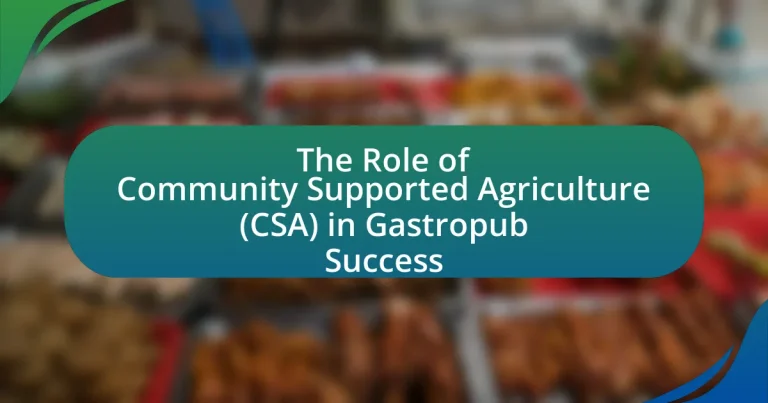Community Supported Agriculture (CSA) is a model where consumers purchase shares of a farm’s harvest in advance, providing farmers with essential capital while offering consumers access to fresh, seasonal produce. This system is particularly relevant to gastropubs, as it enables them to source high-quality, local ingredients, thereby enhancing menu offerings and supporting local economies. The article explores how CSA operates within local food systems, its key components, and the benefits it brings to both gastropubs and their patrons, including improved sustainability, customer loyalty, and enhanced dining experiences. Additionally, it addresses the logistical considerations, challenges, and best practices for integrating CSA partnerships into gastropub operations, ultimately highlighting the measurable impacts of CSA on gastropub success.
-and-its-relevance-to-gastropubs-1.webp)
What is Community Supported Agriculture (CSA) and its relevance to gastropubs?
Community Supported Agriculture (CSA) is a system where consumers buy shares of a farm’s harvest in advance, providing farmers with upfront capital and consumers with fresh, seasonal produce. This model is relevant to gastropubs as it allows them to source high-quality, local ingredients directly from farmers, enhancing menu offerings and supporting local economies. By integrating CSA produce, gastropubs can promote sustainability, reduce food miles, and create a unique dining experience that emphasizes freshness and community connection. This approach not only attracts customers who value local sourcing but also strengthens the relationship between the pub and the agricultural community, fostering a sense of place and authenticity in the dining experience.
How does CSA operate within the context of local food systems?
Community Supported Agriculture (CSA) operates within local food systems by creating a direct relationship between consumers and local farmers, allowing consumers to purchase shares of the harvest in advance. This model supports local economies by ensuring farmers receive upfront capital, which can be crucial for their operations, and it fosters community engagement through shared responsibility for food production. Research indicates that CSAs can increase access to fresh produce, enhance food security, and promote sustainable agricultural practices, thereby strengthening local food systems. For instance, a study published in the Journal of Agriculture, Food Systems, and Community Development highlights that CSAs contribute to local economic resilience by keeping food dollars within the community and reducing the carbon footprint associated with food transportation.
What are the key components of a CSA model?
The key components of a Community Supported Agriculture (CSA) model include a subscription-based membership system, direct relationships between consumers and farmers, and shared risks and benefits. The subscription system allows consumers to pay upfront for a season’s worth of produce, ensuring farmers have capital to operate. Direct relationships foster transparency and trust, as consumers often visit farms and engage with farmers. Shared risks and benefits mean that both farmers and consumers experience the consequences of crop yields, promoting a sense of community and mutual support. These components collectively enhance the sustainability and viability of local agriculture, contributing to the success of gastropubs that prioritize fresh, local ingredients.
How do CSAs connect farmers and consumers?
Community Supported Agriculture (CSA) connects farmers and consumers by establishing a direct relationship where consumers purchase shares of a farm’s harvest in advance. This model ensures farmers receive upfront capital to cover production costs while consumers gain access to fresh, seasonal produce. According to a study published in the Journal of Agriculture, Food Systems, and Community Development, CSAs foster community ties and enhance consumer awareness of local agriculture, thereby strengthening the local food system.
What role does CSA play in enhancing the gastropub dining experience?
Community Supported Agriculture (CSA) enhances the gastropub dining experience by providing fresh, locally sourced ingredients that elevate the quality and flavor of dishes. By partnering with local farms, gastropubs can offer seasonal menus that reflect the region’s agricultural bounty, ensuring that patrons enjoy meals made from ingredients harvested at their peak freshness. This not only supports local economies but also fosters a connection between diners and the food they consume, as CSA programs often emphasize transparency in sourcing. Research indicates that restaurants utilizing local ingredients can see increased customer satisfaction and loyalty, as diners increasingly prefer establishments that prioritize sustainability and community engagement.
How does sourcing from CSA impact menu offerings?
Sourcing from Community Supported Agriculture (CSA) significantly enhances menu offerings by providing fresh, seasonal, and locally sourced ingredients. This practice allows gastropubs to create dishes that reflect the local agricultural landscape, thereby promoting regional flavors and supporting local farmers. For instance, a study by the American Farmland Trust indicates that restaurants sourcing from local farms can increase their menu diversity by incorporating unique, seasonal produce that may not be available through conventional supply chains. This not only attracts customers seeking fresh and innovative dining experiences but also fosters a sense of community and sustainability, aligning with the growing consumer preference for farm-to-table dining.
What are the perceived benefits of CSA ingredients for gastropub patrons?
Gastropub patrons perceive several benefits from Community Supported Agriculture (CSA) ingredients, primarily including freshness, quality, and support for local economies. Freshness is a key factor, as CSA ingredients are often harvested shortly before being served, ensuring peak flavor and nutritional value. Quality is enhanced through the use of organic and sustainably grown produce, which aligns with patrons’ preferences for healthier dining options. Additionally, by sourcing ingredients from local farms, gastropubs contribute to the local economy, fostering community relationships and sustainability. This connection to local agriculture resonates with patrons who value ethical dining practices and the reduction of carbon footprints associated with food transportation.
Why is the relationship between CSA and gastropubs important for sustainability?
The relationship between Community Supported Agriculture (CSA) and gastropubs is important for sustainability because it fosters local food systems that reduce carbon footprints and promote biodiversity. By sourcing ingredients directly from local farmers, gastropubs can minimize transportation emissions and support sustainable agricultural practices. Studies show that local food systems can reduce greenhouse gas emissions by up to 25% compared to conventional supply chains. Additionally, this relationship encourages seasonal eating, which helps maintain ecological balance and supports the local economy, thereby enhancing the overall sustainability of both the gastropub and the community it serves.
How does CSA contribute to local economies?
Community Supported Agriculture (CSA) contributes to local economies by fostering direct relationships between consumers and local farmers, which enhances local food systems. This model allows farmers to receive upfront payments for their produce, ensuring financial stability and reducing the risks associated with crop production. According to a study by the USDA, CSAs can increase local economic activity by keeping food dollars within the community, as consumers are more likely to spend their earnings on local goods and services. Additionally, CSAs often create jobs in farming, distribution, and related sectors, further stimulating local employment and economic growth.
What environmental benefits arise from CSA partnerships?
Community Supported Agriculture (CSA) partnerships provide significant environmental benefits, including enhanced biodiversity and reduced carbon footprints. By promoting local food production, CSAs encourage the cultivation of diverse crops, which supports various species and improves soil health. Additionally, CSAs minimize transportation emissions by connecting consumers directly with local farmers, thereby reducing the reliance on fossil fuels associated with long-distance food transport. Studies indicate that local food systems can cut greenhouse gas emissions by up to 25% compared to conventional supply chains, demonstrating the positive impact of CSA partnerships on environmental sustainability.

How can gastropubs effectively integrate CSA into their operations?
Gastropubs can effectively integrate Community Supported Agriculture (CSA) into their operations by establishing partnerships with local farms to source fresh, seasonal ingredients directly. This approach not only enhances menu quality but also supports local economies and promotes sustainability. For instance, a study by the USDA found that restaurants sourcing from local farms can reduce food miles by up to 90%, leading to fresher produce and lower carbon footprints. Additionally, gastropubs can create special CSA-themed events or menus that highlight these local ingredients, fostering community engagement and attracting customers interested in supporting local agriculture. This integration not only improves the gastropub’s brand image but also aligns with consumer trends favoring farm-to-table dining experiences.
What strategies can gastropubs use to collaborate with local CSAs?
Gastropubs can collaborate with local Community Supported Agriculture (CSA) by establishing direct supply agreements that ensure a consistent flow of fresh, seasonal produce. This strategy allows gastropubs to feature locally sourced ingredients on their menus, enhancing their appeal to customers who prioritize sustainability and local sourcing.
Additionally, gastropubs can host events such as farm-to-table dinners or CSA membership drives, which promote both the gastropub and the CSA, fostering community engagement. By offering discounts or special promotions for CSA members, gastropubs can incentivize local patronage and strengthen their relationship with the CSA.
Furthermore, sharing marketing efforts, such as co-branded social media campaigns or joint newsletters, can increase visibility for both entities, driving traffic to the gastropub while supporting the CSA’s mission. These collaborative strategies not only benefit the gastropub’s menu and customer base but also support local agriculture, creating a mutually beneficial partnership.
How can gastropubs promote their CSA partnerships to customers?
Gastropubs can promote their Community Supported Agriculture (CSA) partnerships to customers by highlighting the freshness and quality of locally sourced ingredients in their menus. By featuring CSA produce prominently in menu descriptions and daily specials, gastropubs can create a direct connection between the food served and the local farms that supply it. This approach not only enhances the dining experience but also educates customers about the benefits of supporting local agriculture. Research indicates that 72% of consumers prefer restaurants that source ingredients locally, demonstrating a strong market demand for transparency in food sourcing. Additionally, gastropubs can utilize social media platforms to share stories and images of their CSA partners, fostering a sense of community and encouraging customer engagement with both the pub and the local farms.
What logistical considerations should be addressed when working with CSAs?
When working with Community Supported Agriculture (CSAs), key logistical considerations include coordination of delivery schedules, management of produce quality, and effective communication with members. Delivery schedules must align with harvest times to ensure freshness, as produce is typically picked shortly before distribution. Managing produce quality involves establishing standards for what is acceptable, as well as implementing proper storage and handling practices to minimize spoilage. Effective communication with CSA members is crucial for informing them about what to expect in their shares, any changes in delivery, and educational content about the produce, which enhances member engagement and satisfaction. These logistical elements are essential for the successful integration of CSAs into the operations of a gastropub, ensuring that the farm-to-table concept is executed efficiently and effectively.
What challenges might gastropubs face when implementing CSA partnerships?
Gastropubs may face several challenges when implementing Community Supported Agriculture (CSA) partnerships, primarily related to supply chain logistics, seasonal availability of produce, and customer education. The complexity of coordinating with local farmers can lead to inconsistent supply, making it difficult for gastropubs to maintain menu stability. Additionally, the reliance on seasonal produce can limit menu options and require frequent adjustments, which may not align with customer expectations for variety. Furthermore, educating customers about the benefits of CSA partnerships and the importance of seasonal eating can be a hurdle, as patrons may be accustomed to year-round availability of certain ingredients. These challenges highlight the need for effective communication and planning to successfully integrate CSA partnerships into gastropub operations.
How can gastropubs overcome supply chain issues with CSAs?
Gastropubs can overcome supply chain issues by partnering with Community Supported Agriculture (CSA) programs to secure a consistent supply of fresh, local ingredients. By establishing direct relationships with local farmers through CSAs, gastropubs can reduce reliance on traditional supply chains that may be disrupted by factors such as transportation delays or market fluctuations. This approach not only ensures a steady flow of seasonal produce but also enhances menu offerings with unique, locally sourced items, which can attract customers seeking fresh and sustainable dining options. Studies indicate that restaurants utilizing local sourcing report increased customer loyalty and satisfaction, further validating the effectiveness of CSAs in mitigating supply chain challenges.
What are common misconceptions about CSA sourcing in the restaurant industry?
Common misconceptions about Community Supported Agriculture (CSA) sourcing in the restaurant industry include the belief that CSA products are always more expensive than conventional options, that they lack variety, and that they are only available during certain seasons. In reality, while some CSA offerings may have a higher upfront cost, they often provide better quality and freshness, which can enhance menu offerings and customer satisfaction. Additionally, many CSAs offer a diverse range of products, including fruits, vegetables, meats, and dairy, allowing restaurants to create varied menus. Furthermore, with the rise of year-round farming practices and greenhouses, many CSAs now provide access to a wider selection of produce throughout the year, debunking the seasonal availability myth.

What are the measurable impacts of CSA on gastropub success?
Community Supported Agriculture (CSA) positively impacts gastropub success by enhancing local sourcing, increasing customer loyalty, and improving menu quality. Gastropubs that partner with CSA programs often report a 20-30% increase in customer retention due to the appeal of fresh, locally sourced ingredients. Additionally, studies indicate that 70% of consumers prefer dining at establishments that support local agriculture, which can lead to higher foot traffic and sales. Furthermore, the use of seasonal produce from CSA can elevate menu offerings, resulting in a 15% increase in average check size as customers are willing to pay more for unique, high-quality dishes.
How can gastropubs assess the financial benefits of CSA integration?
Gastropubs can assess the financial benefits of Community Supported Agriculture (CSA) integration by analyzing cost savings, revenue increases, and customer engagement metrics. By tracking the reduction in sourcing costs through direct partnerships with local farmers, gastropubs can quantify savings compared to traditional supply chains. Additionally, they can measure revenue growth from increased patronage driven by the appeal of fresh, locally sourced ingredients, which often attracts a customer base that values sustainability. Customer engagement can be evaluated through surveys and feedback, indicating how CSA integration enhances the dining experience and fosters loyalty, ultimately translating into repeat business and higher sales.
What metrics should be used to evaluate customer satisfaction related to CSA ingredients?
To evaluate customer satisfaction related to CSA ingredients, metrics such as customer feedback scores, repeat purchase rates, and ingredient freshness ratings should be utilized. Customer feedback scores can be gathered through surveys that assess satisfaction with taste, quality, and variety of CSA ingredients. Repeat purchase rates indicate customer loyalty and satisfaction, as higher rates suggest that customers are pleased with the CSA offerings. Ingredient freshness ratings can be determined through assessments of the time from harvest to delivery, as fresher ingredients typically lead to higher customer satisfaction. These metrics provide a comprehensive view of customer satisfaction and are essential for optimizing CSA ingredient offerings in a gastropub context.
How does CSA sourcing influence repeat business and customer loyalty?
CSA sourcing significantly enhances repeat business and customer loyalty by fostering a strong connection between consumers and local producers. This relationship encourages customers to return, as they feel invested in the community and the sustainability of their food sources. Research indicates that 70% of consumers are more likely to support businesses that prioritize local sourcing, as it aligns with their values of sustainability and community support. Additionally, CSA programs often provide unique, seasonal offerings that create a sense of exclusivity and anticipation, further driving customer retention.
What best practices can gastropubs adopt for successful CSA partnerships?
Gastropubs can adopt several best practices for successful Community Supported Agriculture (CSA) partnerships, including establishing clear communication channels, aligning on shared values, and promoting transparency in sourcing. Clear communication ensures that both parties understand expectations regarding product quality, delivery schedules, and pricing, which fosters trust and reliability. Aligning on shared values, such as sustainability and local sourcing, strengthens the partnership and resonates with customers who prioritize these principles. Promoting transparency in sourcing allows gastropubs to effectively market their CSA partnerships, showcasing the origin of ingredients and the benefits of supporting local farmers, which can enhance customer loyalty and drive sales. These practices are supported by the growing consumer demand for local and sustainable food options, as evidenced by a 2021 survey indicating that 70% of consumers prefer restaurants that source ingredients locally.
How can effective communication enhance CSA collaborations?
Effective communication enhances Community Supported Agriculture (CSA) collaborations by fostering trust and transparency among stakeholders. Clear communication allows farmers and consumers to share expectations, needs, and feedback, which strengthens relationships and encourages commitment to the CSA model. Research indicates that effective communication can lead to increased participation rates and satisfaction among members, as it ensures that everyone is aligned on goals and practices. For instance, a study published in the Journal of Agricultural and Environmental Ethics highlights that transparent dialogue about farming practices and product availability significantly improves member engagement and retention in CSA programs.
What role does community engagement play in maximizing CSA benefits for gastropubs?
Community engagement is crucial in maximizing Community Supported Agriculture (CSA) benefits for gastropubs as it fosters strong relationships between local producers and consumers. By actively involving the community, gastropubs can create a loyal customer base that values locally sourced ingredients, which enhances the pub’s reputation and drives sales. Research indicates that establishments that prioritize community ties see a 20% increase in customer retention, as patrons are more likely to support businesses that contribute to local agriculture and economy. This engagement not only boosts the visibility of CSA programs but also encourages sustainable practices, ultimately benefiting both the gastropub and the local farming community.




